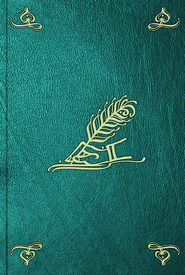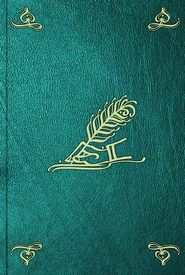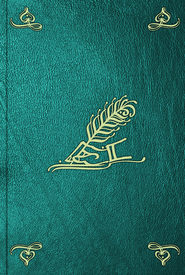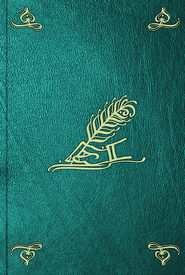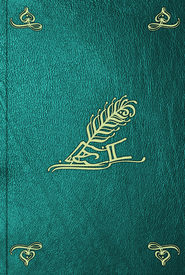По всем вопросам обращайтесь на: info@litportal.ru
(©) 2003-2024.
✖
Private Letters of Edward Gibbon (1753-1794) Volume 2 (of 2)
Настройки чтения
Размер шрифта
Высота строк
Поля
Downing Street, September 8th, 1783.
THE PEACE OF VERSAILLES.
*As we are not unconscious of each other's feelings, I shall only say, that I am glad you did not go alone into Sussex. An American rebel[54 - Mr. Silas Deane.] to dispute with, gives a diversion to uneasy spirits, and I heartily wished for such a friend or adversary during the remainder of the day. No letter from Deyverdun; the post is arrived, but two Flanders mails are due. Æolus does not seem to approve of my designs, and there is little merit in waiting till Friday. I should wait with more reluctance, did I think there was much chance of success. I dine with Craufurd,[55 - Probably "Fish" Crauford, a friend of C. J. Fox, and distinguished by his Eton nickname, given him for his curiosity, from his brother "Flesh" Crauford.] and if anything is decided will send an extraordinary Gazette. You have obliged me beyond expression, by your kindness to Aunt Kitty; she will drink her afternoon tea at Sheffield next Friday. For my sake, Lady S. will be kind to the old Lady, who will not be troublesome, and will vanish at the first idea of Brighton; has not that salubrious air already produced some effects? Peace will be proclaimed to-morrow;[56 - The treaties of peace with the United States, France, Spain, and Holland were signed at Versailles, September 2, 1783.] odd! as War was never declared. The buyers of stock seem as indifferent as yourself about the definitive Treaty. Tell Maria, that though you had forgotten the Annales de la Vertu, I have directed them to be sent, but know nothing of their plan or merit. Adieu. When you see Mylady, say everything tender and friendly to her. I did not know how much I loved her. She may depend upon my keeping a separate, though not, perhaps, a very frequent account with her. Apropos, I think aunt Kitty has a secret wish to lye in my room; if it is not occupied, she might be indulged. Once more, adieu.*
E. G.
476.
To Lord Sheffield
Tuesday Night [September 9], 1783.
It is singular, or rather it is natural that we should both entertain the same idea, for I give you my word that I was very near running down to Sheffield and staying there till Wednesday. Another day, and no letter from Deyverdun; indeed the two Flanders mails are still due. I have written to him this post. To-morrow Crauford dines again with the Secretary, and the business is to be decided.[57 - Gibbon hoped that he might be appointed either a Commissioner of Excise, or secretary to the British Legation at Paris, where the Duke of Manchester was at this time ambassador. The latter post was given to Anthony Morris Storer, M.P. for Morpeth, one of the Admirable Crichtons of the day, celebrated as a dancer, skater, gymnast, musician, and writer of Latin verse. His magnificent library he left to Eton College at his death in 1799. Fox, no doubt, used his influence on this occasion against Gibbon. His lines have been already quoted. Another illustration of his impression that Gibbon was bought by a place is afforded by the following extract from Walpole's Journal of the Reign of King George III. from the Year 1771 to 1783, vol. ii. p. 464. "June 28, 1781: Last week was sold by auction the very valuable library of an honourable representative" (C. J. Fox) "of Westminster, and which had been taken, with all his effects, in execution. Amongst the books there was Mr. Gibbon's first volume of the Roman History, and which appeared by the title-page to have been given by the author to his honourable friend, who thought proper to subscribe the following anecdote: – 'The author at Brookes's said, there was no salvation for this country until six heads of the principal persons in Administration were laid on the table. Eleven days after, this same gentleman accepted a place of Lord of Trade under those very Ministers, and has acted with them ever since.' Such was the avidity of bidders for the smallest production of so wonderful a genius, that by the addition of this little record the book sold for three guineas."] I find Storer is now likely to succeed not so much from the zeal and activity of Lord's N.'s friendship, as because he could resign a place which Fox wants for Colonel Stanhope, to whom however he has given Thomas's company in the Guards. I will write another line to-morrow. Adieu.
E. G.
Newton, I think with reasons postpones any special power of Attorney till we are farther advanced, either with Cromwell's Client or some other purchaser: he says there will be sufficient time to send and return one while the title is under examination.
477.
To Lord Sheffield
Thursday, September 11th, 1783.
*The scheme (which you may impart to My lady) is compleatly vanished, and I support the disappointment with Heroic patience. Crauford goes down to Chatsworth to-morrow, and Fox does not recommend my waiting for the event; yet the appointment is not yet declared, and I am ignorant of the name and merits of my successful competitor. Is it not wonderful that I am still in suspense, without a letter from Deyverdun? No, it is not wonderful, since no Flanders mail is arrived: to-morrow three will be due. I am therefore in a miserable state of doubt and anxiety; in a much better house indeed than my own, but without books, or business, or society. I send or call two or three times each day to Elmsley's, and can only say that I shall fly the next day, Saturday, Sunday, &c. after I have got my quietus.*
Aunt Kitty was delighted with Mylady's letter; at her age, and in her situation, every kind attention is pleasant. I took my leave this morning; and as I did not wish to repeat the scene, and thought she would be better at Sheffield, I suffer her to go to-morrow. Your discretion will communicate or withhold any tidings of my departure or delay as you judge most expedient. Christie writes to you this post; he talks, in his rhetorical way, of many purchasers. Do you approve of his fixing a day for the Auction? To us he talked of an indefinite advertisement.
*No news, except that we keep Negapatnam.[58 - By Article IV. of the Treaty with the United Provinces.] The other day the French Ambassador mentioned that the Empress of Russia, a precious B – , had proposed to ratify the principles of the armed neutrality, by a definitive treaty, but that the French, obliging creatures! had declared that they would neither propose nor accept an article so disagreable to England. Grey Elliot was pleased with your attention, and says you are a perfect master of the subject.[59 - The policy of Great Britain towards America in matters of trade, on which Lord Sheffield had spoken in April, 1783, and, later in the same year, published a pamphlet.] Adieu. If I could be sure that no mail would arrive to-morrow, I would run down with my aunt. My heart is not light. I embrace My lady with true affection, but I need not repeat it.
E. G.
478.
To Lord Sheffield
Downing Street, Friday, September 12th, 1783.
DEPARTURE DELAYED.
*Since my departure is near, and inevitable, you and Lady S. will be rather sorry than glad to hear that I am detained, day after day, by the caprice of the winds. Three Flanders mails are now due. I know not how to move without the final letter from Deyverdun, which I expected a fortnight ago, and my fancy (perfectly unreasonable) begins to create strange fantoms. A state of suspense is painful, but it will be alleviated by the short notes which I mean to write, and hope to receive, every post. A separation has some advantages, though they are purchased with bitter pangs; among them is the pleasure of knowing how dear we are to our friends, and how dear they are to us. It will be a kind office to soothe Aunt Kitty's sorrows, and to "rock the cradle of declining age." She will be vexed to hear that I am not yet gone; but she is reasonable and chearful.* I am grateful for Maria's attention to me or my corpse. Adieu.
Most truly yours,
E. G.
479.
To Lord Sheffield
Downing Street, Saturday, September 13th, 1783.
*Enfin la Bombe a crevé.– The three Flanders mails are arrived this day, but without any letters from Deyverdun. Most incomprehensible! After many adverse reflections, I have finally resolved to begin my journey on Monday; a heavy journey, with much apprehension, and much regret. Yet I consider, 1st, That if he is alive and well, (an unpleasant if,) scarcely any event can have happened to disappoint our mutual wishes; and, 2dly, That, supposing the very worst, even that worst would not overthrow my general plan of living abroad, though it would derange my hopes of a quiet and delightful establishment with my friend.* Upon the whole, without giving way to melancholy fears, my reason conjectures that his indolence thought it superfluous to write any more, that it was my business to act and move, and his duty to sit still and receive me with open arms. At least he is well informed of my operations, as I wrote to him (since his last) July 31st, from Sheffield-place; August 19th; and this week, September 9th. The two first have already reached him.
As I shall not arrive at, or depart from, Dover till Tuesday night, (alas! I may be confined there a week,) you will have an opportunity, by dispatching a parcel per post to Elmsly's, to catch the Monday's post. Let us improve these last short moments: I want to hear how poor Kitty behaves. I am really impatient to be gone. It is provoking to be so near, yet so far from, certain persons. *London is a desert.* I dine to-morrow with the Paynes, who pass through. Lord Loughborough was not returned from Buxton yesterday.* Sir H[enry] C[linton][60 - Sir Henry Clinton succeeded Sir William Howe as commander-in-chief in America in 1778. He was severely blamed for leaving Cornwallis unsupported in the Southern Colonies, and for the disaster at York Town in 1781. He died in 1795, as governor of Gibraltar. His son, General Sir William Clinton, who served with distinction in the Peninsular War, married Lord Sheffield's second daughter, Lady Louisa Holroyd.] found me out this morning; with very little trouble My Lady might rival Betsy; he talks with rapture of visits to be made at Sheffield, and returned at Brighton. I envy him those visits more than the red ribbon* or the glory of his American campaigns.
Adieu.
480.
To his Stepmother
Downing Street, Saturday, Sept. 13th, 1783.
My Dear Madam,
You will be surprized to receive another letter from this place, but I have been detained this whole week unpleasantly enough by the daily expectation of a Flanders mail, though considering the state of the winds and weather it is better to be detained in a good house in Downing Street, than at the Ship at Dover. My departure is now finally determined for Monday morning, and I travel with my own horses. I shall lye at Sittingbourne, and not reach Dover till the afternoon of the next day; my farther progress must depend on the caprice of Neptune and Æolus, but the moment I have escaped from their power I will send a line by the return of the packet.
Lord Sheffield spent two or three days with me in his way from Coventry races into Sussex.
KINDNESS OF THE SHEFFIELDS.
Nothing could exceed, both in word and deed, his kindness and that of his consort on the present occasion, which has indeed shewn me how dear I am to my real friends. They have taken poor Mrs. Porten down to Sheffield, and I am sure will contrive every thing that can support and dissipate her spirits. They both expressed to me in the most obliging terms how glad they should have been of a visit from you; but your mind is firmer, and your prospects are far more chearful than those of my poor Aunt. Adieu, my Dear Madam; though I go with pleasure from party and dependence to a Philosophical retreat, I cannot measure without a sigh the difference (in some degree imaginary) between one, and six, hundred miles.
Ever yours,
E. G.
481.
To Lord Sheffield
Dover, Wednesday, September 17th, 1783,
Ten o'clock in the morning.
*The best laws are useless without proper guardians. Your letter per Sunday's post is not arrived, (as its fate is uncertain, and irrevocable, you must repeat any material article,) but that per Monday's post reached me last night. Oliver[61 - Mr. Oliver Cromwell, a solicitor with whom Gibbon and Lord Sheffield had business transactions. The Protector's son, Henry Cromwell, married Lady Elizabeth Russell, and had, among other children, a son, Henry, who was born in 1658. This son, afterwards Major Henry Cromwell, married Mary Hewling. Their grandson was this Mr. Oliver Cromwell of Cheshunt (1742-1821), the great-great-grandson of the Protector.] is more insolent than his grandfather; but you will cope with one, and would not have been much afraid of the other. Last night the wind was so high, that the vessel could not stir from the harbour; this day it is brisk and fair. We start about one o'clock, are flattered with the hope of making Calais harbour by the same tide, in three hours and a half; but any delay will leave the disagreable option of a tottering boat or a tossing night. What a cursed thing to live in an island! this step is more awkward than the whole journey. The Triumvirate of this memorable embarkation will consist of the grand Gibbon, Henry Laurens,[62 - Henry Laurens had been detained as a prisoner in the Tower since his capture in 1779.] Esquire, President of Congress, and Mr. Secretary, Colonel, Admiral, Philosopher Thompson,[63 - Sir Benjamin Thompson, Count of Rumford (1753-1814), was born in Massachusetts. He was Secretary to the Province of Georgia, and afterwards Under Secretary of State under Lord G. Germain. He fought on the Loyalist side as a Colonel of Dragoons, and also served as a volunteer on board H.M.S. Victory, under Sir C. Hardy. His Essays, Political, Economical, and Philosophical, were published at London in 1796-1802. He was knighted by George III. in 1784, and became a Count of the Holy Roman Empire in 1791.] attended by three horses, who are not the most agreeable fellow-passengers. If we survive, I will finish and seal my letter at Calais. Our salvation shall be ascribed to the prayers of My lady and Aunt; for I do believe they both pray.
Boulogne, Thursday morning, ten o'clock.
Instead of Calais, the wind has driven us to Boulogne, where we landed in the evening, with much noise and difficulty. The night is passed, the Customhouse is dispatched, the post-horses are ordered, and I shall start about eleven o'clock. I had not the least symptom of sea sickness, while my companions were spewing round me. Laurens has read the pamphlet,[64 - Observations on the Commerce of the American States. The pamphlet was written by Lord Sheffield, but published anonymously (London, 1783, 8vo). It reached a sixth edition in 1784, and was translated into both French and German. In it Lord Sheffield opposed Pitt's plan of relaxing the navigation laws in favour of America.] and thinks it has done much mischief – a good sign! Adieu, the Captain is impatient. I shall reach Lausanne by the end of next week, but may probably write on the road.*
482.
To Lord Sheffield
Langres, September 23rd, 1783.
HIS JOURNEY THROUGH FRANCE.







